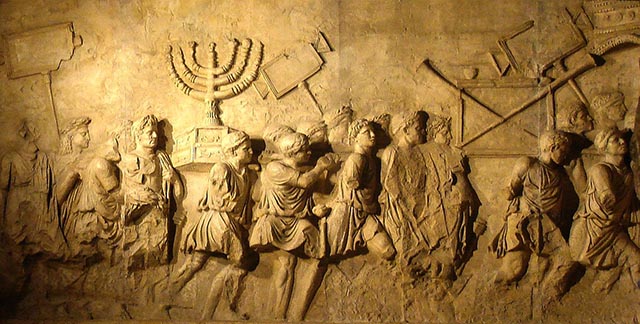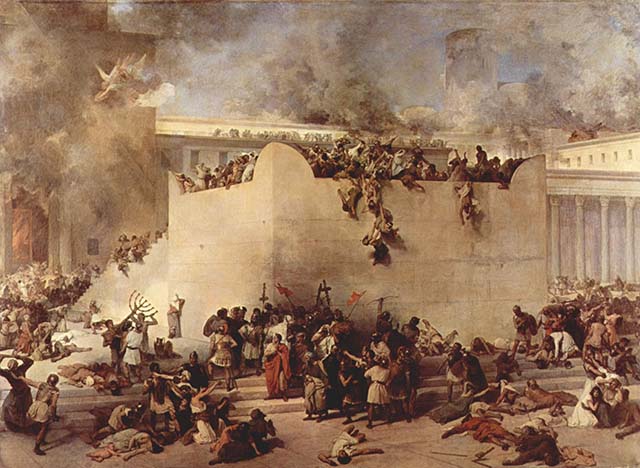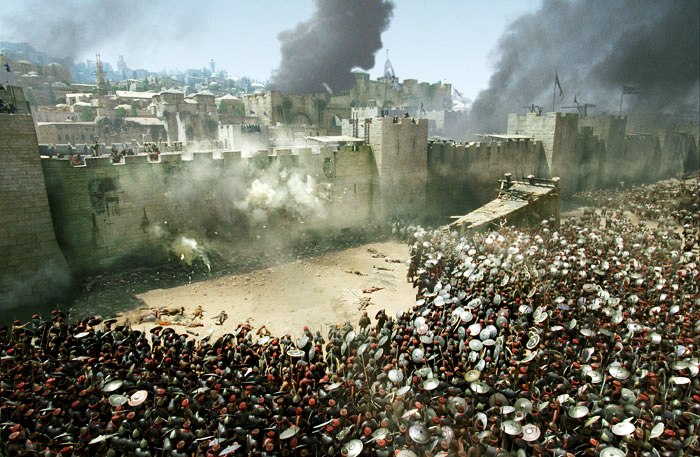I described in the last post the way that changes in a society’s worldview seem to threaten Christian faith, only for it to be later vindicated either by new information, or by closer re-examinaton of the old suppositions, or simply by the spirit of the age going the way of all human fashions. One good example in Christian theology is the way that the historical Jewish background to Jesus’ ministry, long lost, has been rediscovered, and particularly (for the purproses of this post) the importance of his prophecy about the destruction of the Temple in Jerusalem.
I’m relying heavily here on the work of N T Wright, to whose writings you should go for detail of several book-lengths, though the main points below stand in any interpretation that accepts the truth of Jesus’s prophecy against Jerusalem.
Historically, because most Christians have been Gentiles since early centuries, the Jewish background of the gospel has been largely forgotten or considered unimportant (or more recently romanticized as Christian Zionism). Liberal scholars of the nineteenth and twentieth centuries, trying to put Jesus in his historical context, came to all kinds of contradictory conclusions, but one common thread was that because predictive prophecy can’t happen, Jesus didn’t predict the destruction of Jerusalem in 70AD in passages like Mark 13, and that they were invented after the event and put on his lips.
Others (like Albert Schweitzer) reacted by saying that Jesus did make such pronouncements, but actually predicted the imminent end of the world in those passages, basing their theology on the fact that he turned out to be wrong.
More recent research, and especially Wright’s, with which, though I still have to work it all through, I largely agree, shows how this prophecy actually fits at the centre of the historical situation and Jesus’s very Jewish ministry to Israel. Its consequent relevance to a worldwide faith follows from that, but doesn’t so much concern me here.
First century Judaism, in its various forms, considered that the nation had never fully returned from God’s judgement of the Babylonian exile – they remained in bondage to various foreign powers (ending in Roman occupation), to unfaithfulness to torah within the nation and, in many eyes, to the impurity of the current Temple, built by the half-Edomite tyrant Herod and ruled by a corrupt and illegitimate Sadducee High-priesthood.
Accordingly, there was a strong hope in the prophets’ promised liberation from bondage and the restoration of Israel’s nationhood, particularly including dominance over the Gentile nations either through their destruction, or their conversion to Israel’s God. Jewish traitors and sinners would likewise be defeated, and the remnant purified in their keeping of torah. Many believed in a coming Davidic Messiah-King, who apart from being the agent of this historical and political set of events, would build a new, purified temple, and Yahweh’s glory would return at last to Israel. Included in this hope, for everyone it seems apart from the Sadducees, was the promise, taken from Daniel’s prophecy, of a general physical resurrection of the dead to judgement or vindication.
It’s important to understand that this was the established content of the term “kingdom of God”, which Jesus announced as present in him.
The various Jewish groups like the Essenes (of Dead Sea Scroll fame), the Pharisees and numerous militant rebel movements interpreted these hopes differently, especially in terms of who in the nation would benefit as “the faithful remnant”, and who would be judged. But a key conclusion is that, throughout the first century, physical revolt against the Romans was in the air long before the disastrous rebellion of 69-70 that resulted in the permanent destruction of Temple, the end of regular Jewish sacrifice, the ruin of Jerusalem, over a million dead and more enslaved or scattered across the world, and the dashing of Israel’s hopes. But that was forty years off: the general atmosphere in Jesus’s time was that Israel (at least, the good guys) and their way of life would win out, and the rest of the world would finally pay the price for doing them down.
But the tragic events of AD 70 also fulfilled a specific prophecy of Jesus and, according to him, vindicated his claims and the status of his followers as the true Israel. Here’s how, in all too brief summary.
John the Baptist, by preaching repentance and baptism in preparation for Jesus, was essentially redefining the “remnant” who would benefit in the Day of the Lord as those who submitted to his ministry and that of his greater successor Jesus. What is more, he excluded from the kindom those who placed their hope in a xenophobic emphasis on their distinctiveness, through Temple, sabbat and torah, calling them a “brood of vipers” (= “seed of serpents”, cf Gen 3.15) who would be overtaken in the wrath very soon to come.
Jesus endorsed that message, showing that Israel needed to regain its self-awareness as God’s priesthood to the gentiles, not fulminate against them. He condemned the way of violence as being no better (or rather worse) than the Romans. He redrew the lines of acceptance by God to include many of the “bad guys”, and exclude many of those most esteemed (and most zealous for the national cause).
The most astonishing thing of all was that he made loyalty to himself the main criterion for inclusion among the righteous of Israel. he actually redefined the nation around himself – which was, in fact, a very strong Messianic claim. Keeping of torah was relativised (he modified it for the new times in the Sermon on the Mount, and implied it was fulfilled in him), likewise sabbat (“The Son of Man is Lord even of the sabbath”) and likewise the Temple (“One greater than the temple is here” – “Your sins are forgiven” without any need to sacrifice in Jerusalem).
The last point, about the Temple, was emphasised in his final visit to Jerusalem, in which he condemned what his generation had done to the “house of prayer for all nations” when he drove out the traders. He was doing just as the prophet Jeremiah had done in condemning Israel’s idolatry and Solomon’s temple before the Babylonian exile. It was probably this challenge to the power-wielding Sadducees that was the immediate cause of his arrest and death (as it had been for other prophets faithful to the true spirit of God’s covenant). And it was in the wake of his action in the Temple that he made his great pronouncement of doom over Jerusalem and its temple, recorded in Mark 13 and parallels.
I hope that’s enough background to show how the prophecy against Jerusalem wasn’t merely an interesting aside in Jesus’s ministry, but a climax to it, for its fulfilment was to be the event that would publicly prove his status as a prophet to the nation, and so vindicate his ministry (including his rather less public resurrection) and his followers. It would prove him to be more than a prophet, but the Messiah and the Saviour not only of the faithful of Israel, but of the world. Its fulfilment was the public proclamation that God’s kingdom had arrived in him.
What he predicts is couched in terms of OT quotations (strong evidence that it was not read back from the events, which it matches less closely). He predicts the total destruction by fire and desecration of the temple and the ending of sacrifice, by foreign armies, within the current generation. He places the cause in God’s judgement for that generation’s refusal to repent and accept his message and his kingship, exemplified in their violence towards not only outsiders but each other (many in the siege of Jerusalem were to die from gang rivalry rather than foreign action).
He speaks of political troubles in the interim, and of “patient endurance and faithfulness” for the faithful who do follow him, as they witness to him in every Israelite village (though without completing the task). He warns his own people not to join the violence of the patriotic cause, but to flee when the time comes. Most importantly, he says these events will be the means to vindicate him and his people to the world (that’s the import of the apocalyptic imagery, as Wright shows). In other words, he stakes his own credibility as prophet and Messiah entirely on these calamitous events coming true within the time-frame he states – within that generation. A publicly exposed false prophet could not be the Christ. End of Christianity.
But his predictions foretold exactly what happened, as history records. The death of Jesus was probably in 30AD, and no later than 33. The destruction of the temple in 70 fits the classic Hebrew duration of a generation (the 40 years sojourn in the wilderness) – and is close enough to that limit to show that judgement was delayed as long as was commensurate with its fulfilment.
It shouldn’t need saying that even the most astute political forecaster is unlikely to have got it that right. The Romans might well have put down any rebellion without such destruction, as they had before, just as the rebels needn’t have committed themselves to making their last stand in the Temple. Many earlier events could have triggered a showdown – Caligula ordered his statue to be placed in the Temple in 39-40AD; diplomacy produced only a temporary respite and it was Caligula’s timely assassination that prevented what would have been a bloodbath just a decade into Church history. Incidentally it may well be this event that prompted Mark to write “Let the reader understand” in 13.14.
The Roman commander Titus, according to Josephus, had actually ordered the Temple spared in the siege. But Jewish tactics infuriated the Roman troops who, against orders, set fire to an apartment, the fire spreading to the Temple. What political savant could have predicted that sequence 40 years in advance?
 How does all this give us insight into divine action generally?
How does all this give us insight into divine action generally?
Well, on the one hand, it’s easy to see from the history – Josephus for example – what human and political factors led up to the events. As an event it’s unusually well documented for that time. It’s also easy to see, from the gospels, how in Jesus’s view this was a disaster morally waiting to happen in the course of political events: “He who lives by the sword will die by the sword”. The strong sense that that generation has brought their trouble on themselves is clear in many of his sayings, as is the sense of his regret and grief (like that of the OT prophets) on God’s behalf (eg Matt 23.37-39, Lk 19.41-44). This sense of “only yourselves to blame” comes across in the subtle difference between Jesus’s cryptic linkage of the fate of the Temple and his resurrection:
“Destroy this temple , and I will raise it again in three days,” (John 2.19)
and the contradictory testimony at his trial:
“We heard him say, ‘I will destroy this man-made temple and in three days will build another, not made by man.'” Yet even then their testimony did not agree. (Mk 13.58-9)
Some parables, such as the houses on rock and sand (Matt 7.24ff) have that sense of the coming disater as a “natural consequences” of evil choices.
There is also a sense in which the newborn Church will voluntarily contribute to its fulfilment, in preaching as Jesus describes, and in being saved through flight (as the Jerusalem Church was, it seems, by fleeing toa city called Pella). 2 Peter 3.12 speaks of his addressees as speeding the coming of the “day of God” through their godly living: whether this applies (as it may well) to the approaching historical events in Jerusalem or to the final end of history, the principle that human actions influence the timing of God’s judgement is the same.
At the same time, though Jesus’s prophecy implies a warning to change ones ways whilst there is time (through the preaching of his disciples), it could not be seen as provisional, unlike say Jonah’s warning of Nineveh. Jonah became angry at God because he showed mercy when Nineveh repented, but in that case only Jonah’s reputation as a prophet was at stake. In contrast, Jesus puts himself deliberately in a cleft stick: the truth of the prediction is to be the proof that his gospel is true. If Jerusalem does not fall, at the right time, and the Temple and daily sacrifice with it, he invites the whole nation (even the whole world) to ignore him. The fulfilment of the prophecy is to be the acid test of Jesus’s Messiahship, even though most of us give it little thought now if we visit the temple mount in Jerusalem and see its fulfilment down to our own time “until the times of the Gentiles are fulfilled” (Lk 21.24).
But for the prediction to come true, within the time frame, active divine governance must be involved. This is, after all, a prophecy of God’s judgement, just as were those of the prophets before the Assyrian and Babylonian Exiles, as much as it is a moral warning that violence breeds violence. His words were scarcely likely, of themselves, to affect the strategy, tactics and timing of either Jewish revolutionary mobs or Roman countermeasures. When it came true, it came true “according to the word of the Lord.”
You have only to read the majority of the kingdom parables (eg the tenants, Matt 21.33-46) to see the dominance of the theme of God’s personal, active judgement – which one may infer, given the historical background, to be directed by Jesus primarily to that generation of his people:
“Therefore this generation will be held responsible for the blood of all the prophets that has been shed since the beginning of the world …”
Jesus also suggests as much in Acts 1, when the disciples ask whether the time is ripe for the restoration of the kingdom to Israel. Jesus’s kingdom teaching (in retrospect – the disciples still had trouble with adjusting their worldview) suggests that he saw his vindication through the destruction of the Temple as the real inauguration of the kingdom, and of his people as the true Israel. That’s why, as he tells them to concentrate on their mission of salvation and leave the planning to God, he suggests that the Father has already set the times and dates by his own secret authority. The kingdom arrives when God chooses, not when men get around to allowing it to do so.
There is no sense here of God moving people about like unwilling pawns – punishment for sin is not the machination of blind fate. Does it make more sense, then, to say that God makes his plans in accordance with his knowledge of the motives of rebels and Romans, and the righteous lives of saints? Or instead does he keep on adjusting his plans in response to each unpredictable human decision? The question doesn’t even mean much, because the Fall of Jerusalem is historically explicable entirely on the basis of human actions, without the need for any “miraculous interventions” – so what would God’s “plans” have to do with anything, anyway? What is he planning to do that hasn’t already been done by ordinary people?
Well, clearly, quite a lot, if Jesus wasn’t just a very lucky guesser. Clearly, “God will judge this generation for rejecting me” is not the same message as “God knows this generation will judge itself, and they shouldn’t have rejected me either.”
So we get some flavour of what the theologians and philosphers would call “double action”. It’s as if there’s both an earthly series of causes and effects, and a heavenly counterpart in God’s stern but righteous (in Jesus’s eyes, if not in that of modern westerners’) judgement. But it’s not fundamentally a dualism – as if some third power coordinates events on earth and in heaven – God, in Jesus’s mind, is in the end the actual arbiter of events.
The more general lesson is that, if God and human salvation history have this kind of closely intertwined relationship, that is likely to be how God relates to his world, including in his governance of nature. That, after all, is how Scripture decribes things.
You’re always going to be somewhere on the edge of mystery in such matters. As N T Wright says, to try and decide whether Jesus thought that God employed a Roman army to destroy the Temple, or did it himself directly, is a false dichotomy. It’s often hard for moderns to get their heads round why it is false, but it’s an essential task both for our understanding of salvation and our understanding of creation.
But we’d better not lose sight either of human accountability or of God’s sovereignty over history if we want to keep in step with Jesus.




Jon, you might find interesting Philip Jenkins recent series of blog posts. He has been covering the various changes in the cultures around Palestine in the centuries from the return from exile through the first century A.D. The most recent post is particularly relevant. There are several other bloggers at Anxious Bench, so you will have look through it to find the posts by Jenkins on this topic.
Genocide, Ethnic Cleansing and the Jewish War
http://www.patheos.com/blogs/anxiousbench/2015/11/genocide-ethnic-cleansing-and-the-jewish-war/
Preston G.
Preston –
A very interesting link – thanks. I first read “Jewish War” many years ago, and its horrors hold such contemporary resonances to everything from the Holocaust to the apparently very parallel implosion of Middle Eastern Islam into hatred of everything and everyone. One Israeli site I found in preparation for this drew attention to the similar fragmentation of opinion within Israel now and took warning from it.
So it’s very much illustrative of our times, and the true gospel becomes immensely politically relevant – and important to reclaim and understand. And then one suddenly sees this huge link, in the eyes of both the Lord and the early Church, of these geopolitical tragedies with his own preaching, its rejection, and the inevitable results, couched by Jesus in both human and divine terms. Deist it is not!
One footnote may be helpful, and that is to comment on our impression that Jewish Christianity fizzled out, and that therefore the 70AD fall of Jerusalem didn’t serve as the vindication of him and his people that Jesus foretold.
As Jenkins points out, the movements in Judaism that had opposed Jesus disappeared after 70 – the Essenes, the Sadducees, the various Zealot groups all vanished, and the Pharisees were scattered until, much later, they met to produce what we now know as Judaism.
But the Church, which escaped to Pella, was back in Jerusalem the following year, and well-organised with Simeon, son of Cleopas (traditionally Joseph’s brother) in charge – presumably still acting as the centre for the original Judaean Christianity. The first 16 bishops of Jerusalem were all Jews, and it was only after the Bar-Kochba revolt of 130, which resulted in all Jews being forbidden access to Jerusalem, that it became a Gentile-led church.
Yet one has to think of where they all went: many Christian Jewish refugees then ended up in Syria and other diaspora cities (Babylon, Alexandria – even Rome itself) and forming the very backbone of the partly “Gentile” churches there. In other words, they remain our spiritual ancestors.
Another interesting thing is that despite the Temple’s desruction being, in Jesus’ eyes, as much the proof of his ministry as the settlement in Canaan was of Joshua’s, and despite that fact was recognised as such later by the historian Eusebius, the New Testament itself doesn’t look back on its significance even once – in the gospels it’s still represented as a future event.
That reminds me of J A T Robinson’s observation that since nothing in any of the New Testament documents refers to anything beyond 70AD, the natural conclusion is that the NT was complete before then. Even Revelation fits that once one twigs that the references to “Babylon” make much more sense in a time of Jewish persecution based on Jerusalem than pagan persecution based on Rome. Both were built on seven hills (as was Babylon, it seems – and Constantinople, but that’s a bit late for even skeptics to date Revelation).
It kind of explains why nobody’s been able to find evidence for major Roman persecution before Domitian’s time, when it is usually supposed to have been written.